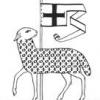I played this but I haven't looked at the source code. Here's some things I noticed, and some suggestions on where to go next if you'd like to improve it/fix it:
* If you go into the space with a sword repeatedly, you will continue to pick up the sword. Since there's no indiciation of inventory, I can't tell if I'm getting multiple swords, or if it's just giving me the notification for walking on the space.
* When I fought the monster on the left, I got stuck. First I killed him, then he refought (like people have been saying) but no matter how many times I hit him, neither of us died. I pressed f like a million times.
* The map doesn't display again after a battle, so I have no idea where I am if I've forgotten my location. Since it updates every move phase, I think it should update here, too.
Here's some things you could try adding, that I think would be a good challenge based on what it seems you can do so far:
* Have the room be a random size and shape (even if it's just differenlty proportioned rectangles), instead of the same square every time.
* Have monsters and items appear at random locations. You don't have to have random amounts -- it could always be the same sword and two monsters, but in different places every time.
* Have a victory and loss condition (run out of HP and die, defeat all monsters and win, for example)
* Different weapons with different abilities, that they player can choose to replace with his current weapon.
Once you've done those, you can even try adding monsters that move and chase the player (or run, or do different things... they could have a simple AI). So you'll have to make an AI and turn-taking system.
Though to add these things, it might be good to look into object-oriented programming. I think that seems like a good next step after this. I haven't looked at the source code yet, but it doesn't seem like you're using classes based on the way it plays.
For example, if you wanted the monsters to be of random types and in random places, you could make a monster class, and when creating the initial map, create monster objects and assign them random coordinates (which are stored in the class in variables). Stuff like that. This will also make the program more expandable so you can add new things more easily.
OK, I decided to downlaod the source code. It's very difficult to read. Like said, use comments everywhere. Unless something would be glaringly obvious to someone looking at your code (imagine they've never even run the program and they're JUST looking at the code, figuring out what it does... they might not even know it's a game... pretend they'll never run the program and need to figure it out just from the code... comment all the time!)
Also, the formatting... like said, white space is important. You want to tab stuff. When your blocks are indented, they are a lot easier to read... especially when there are blocks within blocks. Just looking for braces nad trying to figure them in your head is a strain.
This will not only help others reading your code, but it will help you, too. If you leave to work on something else, then come back to this project later, you may find you have no idea what your code even does anymore... and without comments and nothing being indented or spaced well, you will have a lot of trouble trying to figure out how your program works anymore.






